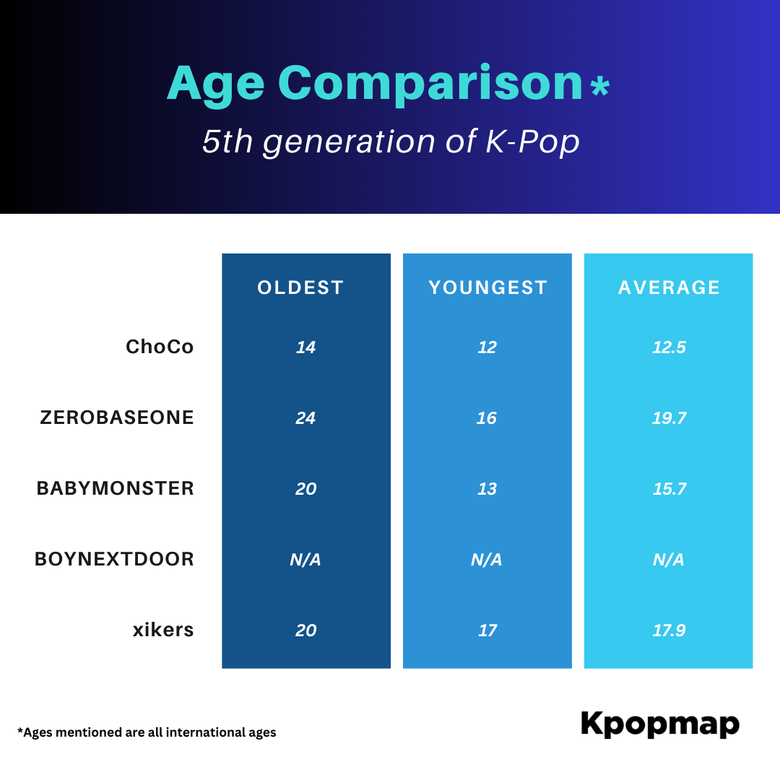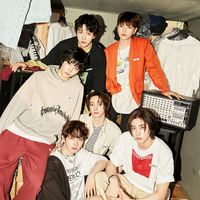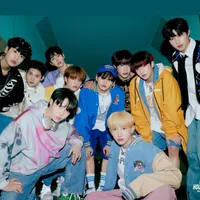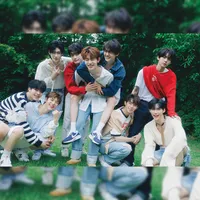
ChoCo Entertainment
K-Pop is currently one of the biggest and most successful entertainment industries in the world. Known for birthing powerhouses like BTS, BLACKPINK, BIGBANG, and more, K-Pop has achieved grander success now than one could have imagined ten or twenty years back. It can no longer be reduced to simply a genre or an umbrella term but is instead appreciated in all its diverse glory.
Now, if you have been a fan of K-Pop for a while now, you could not have missed the discussion about generations in K-Pop. In this respect, there’s a new term making the rounds in media and online communities – the “5th generation“. K-Pop groups like ChoCo, ZEROBASEONE, BOYNEXTDOOR, BABYMONSTER, and xikers are already being referred to as the 5th generation of K-Pop.
Among the above, all the groups except for xikers are currently pre-debut. Still, they are said to be ushering in the 5th generation of K-Pop. With the constant debate surrounding generations, such a statement carries great significance, but the leading conversation surrounding these groups seems to revolve around the members’ ages.
As you can see from the table above, the youngest K-Pop idol set to be a part of the 5th generation of K-Pop is currently 12 years old – Anpan from ChoCo. The oldest member from the same group is Jake, who is 14 going on 15 in international age. The other trainees of ChoCo Entertainment – TJ and Sean, are the same age as Anpan – 12. This makes the average age of ChoCo 12.5, which is even short of being teen age! As such, ChoCo is creating quite a buzz over the internet, with some netizens expressing their concern over the idols and others cheering them on for their early start.
This begs the question: is it okay for idols to debut that young? Let’s get into it!
For starters, the K-Pop industry has always debuted young artists. Take BoA, for example – one of the pioneers who globalized K-Pop for the first time. She debuted at the age of 13, but she started training at the age of 11. Similarly, LAPILLUS’ HaEun debuted at age 13, SHINee’s TaeMin debuted at 14, and so did f(x)’s Krystal, ENHYPEN’s Ni-Ki, P1Harmony’s JongSeob, CLASS:y’s Kim SeonYou, NewJeans’ HyeIn, IVE’s Jang WonYoung, and more. However, just because there’s precedence doesn’t mean it is received positively on a unanimous level.
Many netizens and K-Pop fans are of the opinion that debuting artists at a young age is exploitative and deprives them of the natural course of their childhood. Even when idols don’t debut early, in most cases, they start training at an even younger age. These young idols are also assumed to be incapable of handling their finances or negotiating their contracts and, as such, may often fall into traps.
From a commercial point of view, debuting young idols is highly beneficial because if a trainee debuts earlier in life, there’s a greater chance for them to achieve success earlier, reach a peak of popularity earlier and promote for longer, thus making their companies more money. Younger idols are also more relatable to the younger audience, which continues to be a majority in the K-Pop fandom, thus making them more lucrative as a business model. With all of these pros, it is not unusual that companies will tend to capitalize on the youth of their trainees and debut them young.
Still, it is worth noting here that K-Pop is definitely not the only industry employing young people. Child actors, models, and talents, in general, make up a considerable portion of the global film and television industry at large. However, the reason why netizens are wary of extremely young idols debuting might be that the K-Pop industry, in particular, is characterized by toxic consumerism and fan culture that facilitate parasocial relationships between fans and idols but even if we were to step away from the entertainment world, there are child athletes and performers competing internationally, and even ordinary kids who go to school aren’t exempt from the pressures of academia. This is to say that facing the world at a young age is difficult, no matter the field you are in, and singling out idols might not be too helpful.
When speaking of childhood, it is hard to ignore how “normal” students are also robbed of the same owing to the education system. The pressure of getting good grades and ensuring admission into prestigious universities is nothing new, especially in South Korea. The evils of this system have been brought out in multiple K-Dramas like “SKY Castle” and “Extracurricular“, highlighting how academia can push a student to the brink of insanity and, worse, lead them to make drastic decisions. Similarly, a sportsperson who competes from a young age or a dancer who has only ever known the stage is taught to abandon their childhood in favor of their careers. Yet, we cannot say that all of these children were forced to do so.
A high school student who dreams of going to medical school and a 10-year-old ballet dancer who wishes for nothing but to become a prima ballerina/premier danseur are no different from a 12-year-old who wants to shine on stage like her favorite K-Pop star. Pursuing these dreams from a young age is simply a personal, usually autonomous decision, and in all three cases as well as others of the same nature, the responsibility is on the adults to protect them and their dreams so that even if they start early, they are granted the ideal pleasures of growing up.
Young or otherwise, idols deserve a healthy working environment, mutually profitable and transparent contracts, responsible management, and privacy. To simply dismiss young artists by virtue of their age is rather irresponsible. Instead, we must hold their agencies accountable for their industry education, awareness, and growth, as well as safety. While it is an unfortunate truth that child artists are often not treated fairly, this burden should not fall on them or their aspirations. As utopian as this argument may seem, it is much better than accepting mistreatment as the norm. After all, for the future of the world to flourish, the present must change.
In this respect, let us take a look back at ChoCo. Members Jake and Anpan, who are 14 and 12 years old, respectively, have more scope to explore and develop their talents beyond the boundaries of studying or traditional idol training than they would if they were forced to postpone their training/debut to 18 years old, for instance. ChoCo Entertainment has revealed that their unique artist incubation system is geared towards creating independent artists who value their creativity and originality before anything else. So, it comes as no surprise that besides singing and dancing, Jake and Anpan are both drummers; Jake is also a DJ and painter, whereas Anpan’s specialties are acting and runway walking.
In conclusion, it wouldn’t be an exaggeration to say that the industry is making progress in the right direction but it is equally fitting to state that it has a long way to go before actually effecting a tangible change.
What do you think of more and more young idols debuting in the K-Pop industry? Share your thoughts with Kpopmap in the comments section down below!
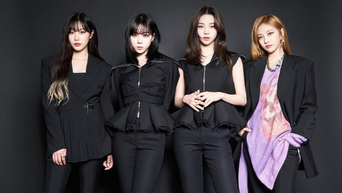
Netizens Discuss K-Pop Generations: What Generation Of K-Pop Are We In?FanbuzzApr 6, 2022

Alpha Gen K-Pop Group ‘ChoCo’ Is Set To Show Its Super Rookie Qualities In Reality Show “ChoCo In Hollywood” Airing This FridayQuick ReadsMay 9, 2023
